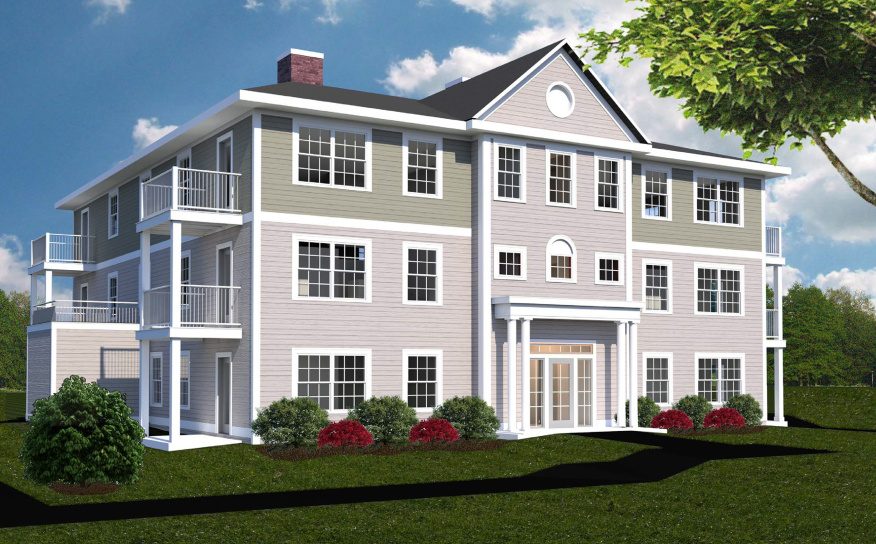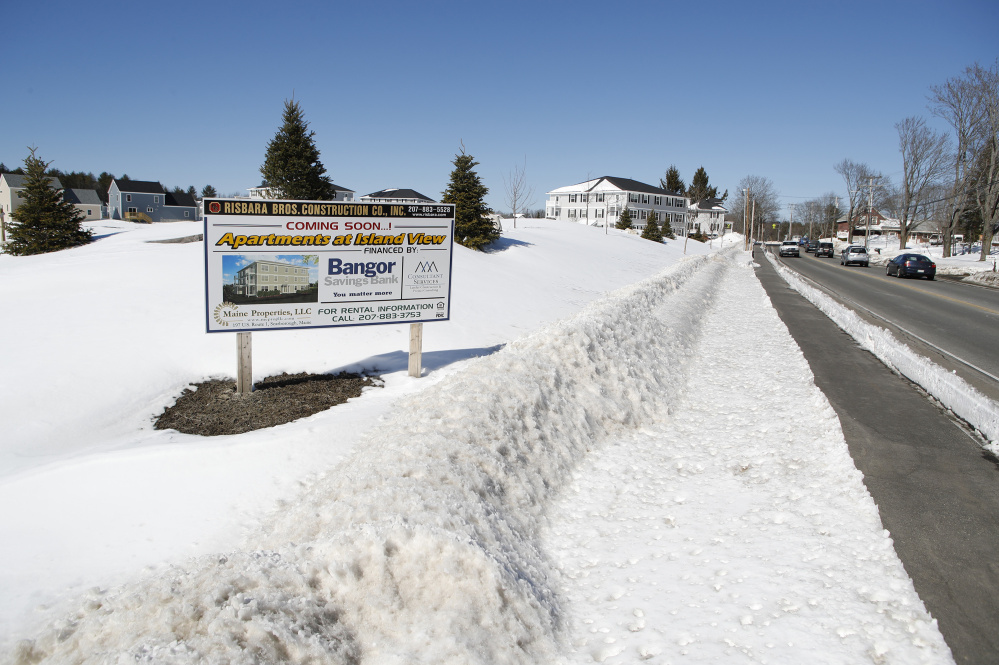Last summer, developer Tom Ly submitted plans for 96 new apartments on the north side of Westbrook.
The timing seemed perfect given the clear demand in the market. The year before, the Westbrook Planning Board had approved more than 330 new units of housing. Those projects included a sprawling subdivision on Spring Street called Blue Spruce Farm – nearly 200 single-family homes, condos and market-rate apartments. The neighborhood’s developer, Risbara Bros., was already planning an expansion with more than 300 additional units to meet the demand from buyers and renters. A few other projects were going up elsewhere in Westbrook – seven condos here, 20 duplexes there.
But resistance was building, too.
A mass of neighbors had organized to oppose the second phase of Blue Spruce Farm, and would-be neighbors of Ly’s proposal on Austin Street joined their cause. News that a developer had purchased a vacant golf course near Blue Spruce Farm added to the sense of urgency for the opponents. More than 400 residents signed a petition calling for a six-month moratorium on residential construction and a review of Westbrook’s land use ordinances.
The pressure from neighbors did lead to small victories on these projects.
Ly withdrew his plans and recently resubmitted a sketch with 36 condominiums for seniors 55 years or older. “We listened to the neighbors,” Ly said.
A legal dispute over a land deal forced Risbara to scale back as well, and in February of this year the Westbrook Planning Board finally approved a revised plan for 110 apartments.
But neighbors still haven’t seen the sweeping change they wanted. Westbrook officials say a review is still in the works, but residents say their chief concerns about the pace of growth have been ignored.
“There’s been so much push to improve or change our ordinances, and they come back the same or less,” said Kate Bergeron, who lives on McKinley Street near Blue Spruce Farm. “I consider that a failure.”
NEED FOR CHANGES ‘OBVIOUS’
In Portland’s neighboring city, a regional housing shortage and a surge in new home starts prompted the call last year for a 180-day stay on residential building permits.
The neighborhood petition asked the city to use that time to revamp its land use ordinance, increase the minimum lot size for new homes and enact a process for collecting impact fees from developers. Several residents advocated for a form-based code, which regulates how buildings look rather than how they are used.
The Westbrook City Council eventually voted down the moratorium, but promised that a review of ordinances would take place. It called a public meeting to start that process in November. Elected officials like Mayor Mike Sanphy and Council President Brendan Rielly agreed with the need for changes.
“Everyone anticipates that we will need to make changes to our design standards and our zoning ordinances,” Rielly said this month. “That was always something that seemed to be fairly obvious.”
The City Council asked the planning department to draw up a proposal for charging fees on a development’s future impact on schools and the sewer system. City Administrator Jerre Bryant said that plan will be presented to the council this spring.
“There needs to be some balance,” Bryant said. “We don’t want the price of growth and development to become an undue burden on the taxpayers.”
Some local officials also seem ready to dig into the concerns.
In March, the City Council agreed to amend municipal codes to replace the term “special exception” with “conditional use.” The meaning – a use that is allowed but could be subject to extra conditions from the Planning Board – would be the same. But the term caused confusion among residents during the months-long debate about the moratorium, and the new name is more consistent with other communities.
The Planning Board supported the change at its meeting in February, but seemed to be looking for more.
“I agree the name change has to happen to avoid confusion, but I guess I feel like it shouldn’t stop there,” board member Rebecca Dillon said at last month’s meeting. “Whether that’s another step at another time…”
She trailed off.
“It could be,” said Chairman Ed Reidman.
Before the vote, Dillon spoke up one more time.
“I think we can do better,” she said.
ACTIONS SO FAR CALLED INADEQUATE
People who were vocal supporters of the moratorium have echoed Dillon’s sentiment.
At public meetings last year, residents asked repeatedly for changes to ordinances related to density and minimum lot size. City Planner Jennie Franceschi said the Planning Board has not been discussing those ideas because they could have unintended negative consequences for individual homeowners.
“During this time, we have been working on several areas of our ordinances to discuss how to utilize the review process to its fullest potential as well as elimination of confusion for the public during the review process,” Franceschi wrote in an email. “When we understand our ordinances better, the process is improved and the public has a better appreciation for the process.”
She said the Planning Board is now more confident in what it can and cannot do. For example, its members requested changes in building colors and traffic improvements for the apartment buildings in the second phase of the Risbara subdivision.
“I hope it has empowered the board to feel it has more of a say,” Franceschi said. “The board does have the ability to make recommendations, to make architectural (changes). We deserve to be able to say we want quality.”
She noted that the city’s comprehensive plan directed dense residential development to take place in central parts of the city, like the Blue Spruce Farm neighborhood, rather than in its outskirts. “There’s a history the community has chosen, and this project was in line with the way it was supposed to unfold,” she said.
But Bergeron, from McKinley Street, said the city should be able to impose more conditions on large-scale developments. The changes the Planning Board requested on Blue Spruce Farm still don’t make the apartment buildings compatible with the surrounding neighborhoods, she said.
“It’s showing us the weakness in our ordinances,” Bergeron said.
Flynn Ross, a Middle Street resident, is disappointed that the city hasn’t considered changes to its land use ordinances on density. She said the city decides how many units are allowed on a piece of land in a way that benefits developers, not neighbors.
“Density can be a good thing,” she said, if it’s built to accommodate things such as play spaces for kids and gathering spaces for older people. “That would be much better for the city than the very industrialized living spaces.”
THE PACE OF HOUSING GROWTH
Councilor Lynda Adams, who was elected to represent Ward 5 in November, said she heard from upset residents after the latest Risbara apartments were approved.
“I want to make sure what is going on is going to be similar to the (adjacent) neighborhoods,” she said. “How we accomplish that, I don’t know.”
Westbrook issued building permits for only 58 new housing units in 2016 – an 80 percent decrease from the previous year.
The city has already outpaced that number for 2017. In February, the Planning Board approved the 110 apartments for Risbara. It is also considering Ly’s project for 36 senior condos and a subdivision of 13 single-family homes.
A large-scale project like Blue Spruce Farm is a rarity, Franceschi said, and the pace of development in Westbrook has followed the trends in the broader market.
“Everyone has sort of taken a breath,” she said. “There’s definitely been a pausing effect.”
CITY STILL ATTRACTIVE, BUT CONCERNS
It is unclear whether that pause will last.
Tim and Marie Flaherty, who run the real estate firm The Flaherty Group, are the developers who proposed a 13-home subdivision on Berkshire Way. Despite last year’s debate over a moratorium, they believe Westbrook is still an attractive place to build.
“It’s an appealing community,” Marie Flaherty said. “It’s certainly affordable compared to areas of Portland, and it’s very easy to get to wherever they work.”
For Ly, it is too early to say whether he would build in Westbrook again. He has several projects pending in other towns as well, but he is relatively new to residential development.
“You’re trying to make as many people as happy as possible within reason,” he said. “You want to do as much research as you can, and you want to ask the people what they want.”
Rocco Risbara, president of Risbara Bros., agreed that the market is still hot in Westbrook. Both buyers and renters have snatched up his available units in Blue Spruce Farm. But he had a word of caution for other builders.
“To be very honest, we are very concerned about the future growth of that city and what’s going to happen there,” Risbara said. “We are concerned with the fact that this neighborhood opposition has built up, and we think it’s going to hinder the city in the years to come.”
Megan Doyle can be contacted at 791-6327 or at:
mdoyle@pressherald.com
Twitter: megan_e_doyle
Copy the Story LinkSend questions/comments to the editors.





Success. Please wait for the page to reload. If the page does not reload within 5 seconds, please refresh the page.
Enter your email and password to access comments.
Hi, to comment on stories you must . This profile is in addition to your subscription and website login.
Already have a commenting profile? .
Invalid username/password.
Please check your email to confirm and complete your registration.
Only subscribers are eligible to post comments. Please subscribe or login first for digital access. Here’s why.
Use the form below to reset your password. When you've submitted your account email, we will send an email with a reset code.